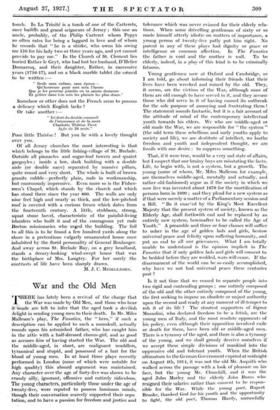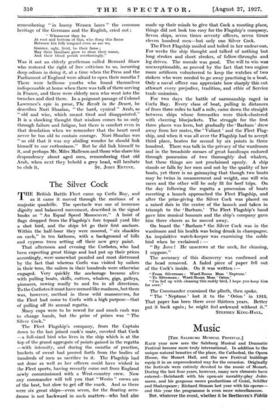War and the Old Men
r HERE has lately been a revival of the charge that the War was made by Old Men, and those who hear ade are left to infer that the aged took a devilish delight in sending young men to their death. In Mr. Miles Malleson's play, The Fanatics, the " hero," if such a description can be applied to such a numskull, actually rounds upon his astonished father, who has caught him in the attic with a half-dressed chorus-girl, and as good as accuses him of having started the War. The old and the middle-aged, in short, are malignant muddlers, tyrannical and stupid, and possessed of a lust for the blood of young men. In at least three plays recently performed in London (none of which were notable for high quality) this absurd argument was maintained. 'Any character over the age of forty-five was shown to be crassly silly, ignorant, offensive and entirely ridiculous. The young characters, particularly those under the age of _twenty-five, were reputed to possess luminous minds, though their conversation scarcely supported their repu tation; and to have a passion for freedom and justice and tolerance which was never evinced for their elderly rela- tions. When some drivelling gentleman of sixty or so made himself utterly idiotic on matters of importance, a young person of twenty-five patly put him right. No parent in any of these plays had dignity or grace or intelligence or common affection. In The Fanatics the father is void and the mother is null; - To be elderly, indeed, in a play of this kind is to be criminally fatuous.
Young gentlemen now at Oxford and Cambridge, so I am told, go about informing their friends that their lives have been wrecked and ruined by the old. They, it seems, are the victims of the War, although none of them are old enough to have served in it, and they accuse those who did serve in it of having caused its outbreak for the sole purpose of annoying and frustrating them ! The statement sounds fantastic, but it is a fair account of the attitude of mind of the contemporary intellectual youth towards his elders. We who are middle-aged or old made the .War, we are responsible for " the system " (the odd term these rebellious and surly youths apply to society and life), we are destitute of intellect, we loathe freedom and youth and independent thought, we are fossils with one desire : to suppress something.
That, if it were true, would be a very sad state of affairs, but I suspect that our brainy boys are misstating the facts. Life, to begin with, is not a system, but a growth. The young (some of whom, Mr. Miles Malleson for example, are themselves middle-aged, mentally and actually, and rather old-fashioned) argue as if the society in which we now live was invented about 1870 for the mortification of persons born in 1890 ; and they plead for a new system as if that were merely a matter of a Parliamentary session and a Bill. " Be it enacl-ed by the King's Most Excellent Majesty that the present system of society, known as the Elderly Age, shall forthwith end and be replaced by an entirely new system, hereinafter to be called the Age of Youth." A preamble and three or four clauses will suffice to usher in the age of golden lads and girls, bestow universal peace and felicity upon suffering humanity, and put an end to all our grievances. What I am totally unable to understand is the opinion implicit in The Fanatics that if only golden lads and girls will consent to be bedded before they are wedded, wars will cease. If the disarmament of the world can be so easily accomplished, why have we not had universal peace these centuries past ?
Is it not time that we ceased to separate people into two rigid and contending groups ; one entirely composed of the old and the other entirely composed of the young, the first seeking to impose an obsolete or unjust authority upon the second and ready at any moment of ill-temper to rob it of its life ? The stoutest supporters of Signor Mussolini, who declared freedom to be a fetish, are the young men of Italy, and the most resolute opponents of his policy, even although their opposition involved exile or death for them, have been old or middle-aged men. There is a tyranny of the aged, and there is also a tyranny of the young, and we shall grossly deceive ourselves if we accept these simple divisions of mankind into the oppressive old and tolerant youth. When the British ultimatum to the German Government expired at midnight on August 4th, 1914, it was not the old Mr. Asquith who walked across the passage with a look of pleasure on his face, but the young Mr. Churchill, and it was the aged John Morley and the elderly John Burns who resigned their salaries rather than consent to be respon- sible for the War. - While the young poet, Rupert Brooke, thanked God for his youth and the opportunity to fight, the old poet, Thomas Hardy, sorrowfully remembering " in loamy Wessex lanes " the common heritage of the Germans and the English, cried out : " Whosoever they be At root and bottom of this, who flung this flame Between kin folk tongued even as are we, Sinister, ugly, livid, be their fame ; May their familiars grow to shun their name, And their blood perish everlastingly."
Was it not an elderly gentleman called Bernard Shaw who restored the right of free criticism to us, incurring deep odium in doing it, at a time when the Press and the Parliament of England were afraid to open their mouths ? There were bellicose youths who found themselves indispensable at home when there was talk of them serving in France, and there were elderly men who went into the trenches and died there. In a poignant passage of Colonel Lawrence's epic in prose, The Revolt in the Desert, he describes Nuri Shaalan, " the hard, cynical " Arab, as " old and wise, which meant tired and disappointed." It is a shocking thought that wisdom comes to us only through failure and fatigue, but there is comfort even in that desolation when we remember that the heart need never be too old to contain courage. Nuri Shaalan was " so old that it was my abiding wonder he should link himself to our enthusiasm." But he did link himself to it, and perhaps Mr. Miles Malleson and those who share his despondency about aged men, remembering that old Arab, when next they behold a grey head, will hesitate



































 Previous page
Previous page